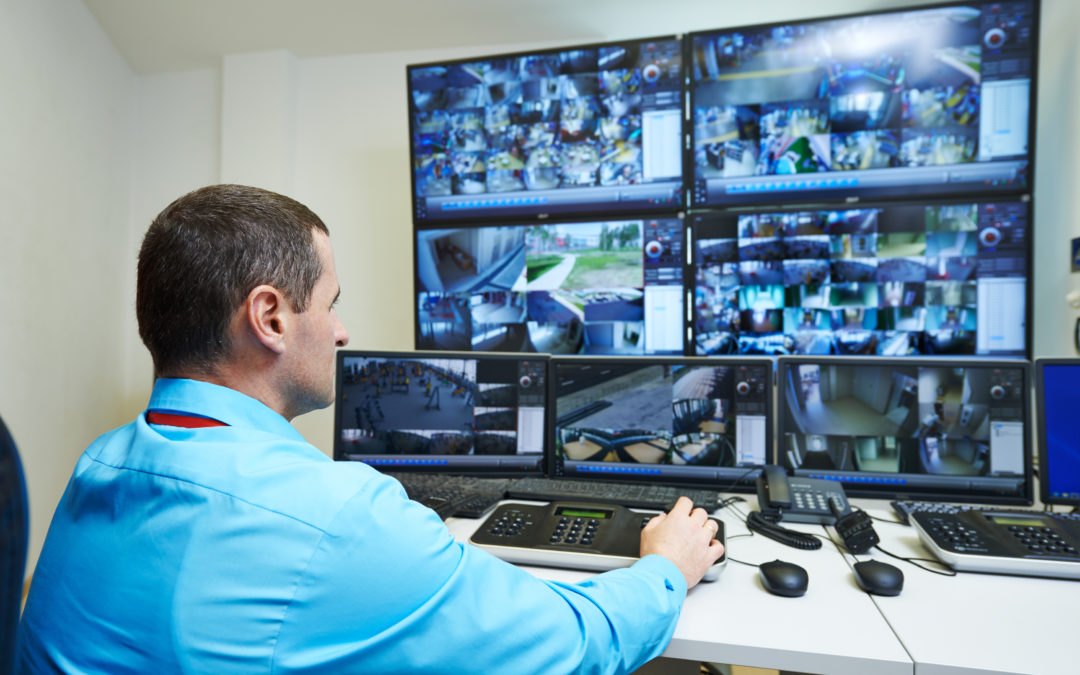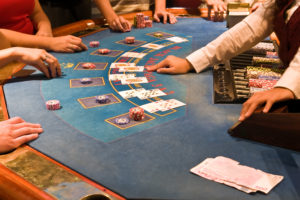
The Eye In The Sky: Life From A Surveillance Room
By The Biometrica Blog Team
Butch Pracale, the Director of Surveillance at the Four Queens Resort and Casino doesn’t like to share information. “I’m paranoid,” he laughs. “I watch out for the bad guys.” He’s done just this — looking out for criminals and criminal intent on casino floors — for 35 years. That’s also why he didn’t want his picture up here either. We humored him on that.
The Biometrica Blog team decided that same professional distrust of everything, and those three-plus decades of experience, made him the perfect person to sit down with for a freewheeling discussion on surveillance, security, and sharing information — something that doesn’t come naturally to his kind of professional — in a new digital-meets physical age and a vulnerable world, increasingly built around a “community” of people that “watch out for the bad guys.” Read on.
We’re looking at all these TV monitors, and images from dozens of cameras. How do keep track of all of this, what do you look at or look for?
You can only look at one monitor closely at any given time. Really and honestly, beyond that, all you can do is catch some movement on others.
What kind of movement?
Movement, typically, is constant and consistent and repetitive. When things are that way, in repetitive patterns, things looks normal. When there are things that are delayed, or out of pattern, for instance, when a hand goes where it normally does not go, or a new hand comes in from a different direction, we notice those. Those are our keys to determine that something is wrong.
You also mentioned delays?
If there’s a delay and cards aren’t being dealt, if there’s a delay and balls aren’t being spun, then those things also key our attention to those [other] monitors.

So your experience tells you something is wrong, because you’re watching for those through your peripheral vision?
Yes, because whatever it is that causes us to react is a break in procedure. When things are supposed to go left to right and we see a right to left? Now there’s a problem. Is it ingrained? Yes. Is it training? Yes. Is it experience? Yes, again. You don’t know there’s something wrong till somebody draws your attention to it.
So you look for predictors — anything that’s off base, or off sync?
Absolutely. And we do practices. There are, what I call, subconscious actions to prompt conscious action. Bottom line? People [on the casino floor] have activity that they are required to do. That is also activity we are required to see being done. If there are any irregularities during the course of making that observation, we call attention to it. For instance, if a security officer takes a fill and instead of going to the table, he goes out the door, you know there’s a problem.
How do you protect against remote access? For $15, if I can get a proximity card reader that can scan access codes remotely, as long as I’m within physical distance of a person, and if I know who the people with access to a cash room are, what is to prevent me from cloning their cards digitally?
In our case, we don’t use proximity cards. We use physical keys. And doors manned by security personnel can only be opened by someone else, not the person going in. At the cage, for example, you can’t get in if you don’t have a key, or you’re not buzzed in.
So then someone wanting to break in has to do it the old fashioned way, bash someone over the head or something?
[Laughs]. Yes. But most other casinos probably use cards though. I don’t know what other casinos do otherwise, but hopefully their cage and soft count door are in view of the security podium. Ours are.

Interesting that they’re right opposite each other, across the casino floor.
They have to be. If there’s someone strange coming through the door, or something different happening, the security podium has got to have that [line of sight] to spot them immediately, and there are panic buttons all over the place. Some cages, in money-handling areas, are alarmed, so if someone were to penetrate the door one way or the other, surveillance cameras would automatically direct themselves at that door and identify the person going in.
Is there any overlap between security and surveillance teams, or situations where teams are in conflict?
[Laughs again]. Always! Seriously though, we are the eyes, they are the feet. We ask them to do something, and sometimes they have difficulty, no doubt, doing that thing. They do hear more though, and they trust us enough to agree to grab, say, that guy with the green hat and purple feathers, when we request it. At the end of the day, they trust us enough to do anything we specifically request, because anything we request is only for the safety of the property or people, and to protect us all from liability.
In the more than 30 years that you’ve been in surveillance, especially with the technological changes that have come in, are the basic threats the same? If you had to pinpoint the three major threats to a surveillance team, what would they be?
— No. 1 would be power. You can’t function without power. Which is why we have a 30kVA UPS and unlimited power supply at the back. Our cameras, for instance would remain powered, if in fact, there were a threat to our direct power supply, for at least five hours.
— The next would definitely be equipment. You can’t really function again without the equipment that allows you to have eyes on everything. Our cameras are running 24 hours a day, seven days a week, and can function even in the most minimal light. And with advances in tech, we have access to networks and systems that are very helpful.
— The third is information sharing. I’m terrible at sharing information. Part of our advantage is our mystique. It’s not secret, but the value of nobody knowing precisely what we do operationally, except us, is important.
How do you balance the need for mystique with the need to know and sharing required in information systems like SSIN, Biometrica’s Security and Surveillance Information Network?
I really don’t like to share. So this has been a change. If our cases are pending, we don’t share that information till they’re settled. That’s a great point from where to send out relevant information and share. The problem is that once we release it to be shared, some clerk somewhere shares that video footage with a TV channel, and the next thing you know, we’re on some program about cheating in Vegas. We would prefer no one has our layout, how we function etc. But yes, it’s a little different now, with technology. It just depends on the information that’s being shared.
You essentially distribute it into two piles then: Operational functions, that are kept private, and crime prevention and crime tracking, that depend on whether your cases have closed or not. How useful is SSIN to you?
SSIN, in my opinion, is more useful when it comes to education than anything. Sometimes though, I don’t believe half the things that come through on it directly [in unfiltered mode]. I’ve been in the business for 35 years, in surveillance, and some of the narrations that I get on SSIN, they come from some novices.
[Note: SSIN’s early warning system works at two levels, alerts or information in real time that are unfiltered, shared by a network of background-checked security and surveillance professionals, and second, material sent out through Biometrica’s Fusion Center. The latter is made up of validated alerts, but has a slight time lag for obvious reasons].
What unfiltered narrations or alerts do you not keep as relevant?
Say somebody is arrested for presenting false identification in Atlantic City. Who that is doesn’t mean much to others when you’re 2,500 miles away. It really doesn’t. But when I see those perpetrators participate in other scams, when I see them manipulate cards, when I see them manipulate games to their advantage, that means a lot to us.

Interesting. False IDs though, can travel, even if the person doesn’t. You can buy ID on the underground black market.
Yes, so it really depends on the information. Certain things stated by certain users [of the network], are very local. The people-related alerts related to local information in the East are not valuable nationally, not to Las Vegas, or other venues, because it generally isn’t profitable [to an ID fraudster] to travel in person. If it was a particular card scam, they would go from Atlantic City to state to state to state, till they get to Las Vegas and California, in order to profit by it. But if it’s a simple scam, we’ll discount it.
There are four aspects to information being shared on our digital network — where it’s done, the person doing it, what it is, and the techniques used by the perp, and you use whatever is relevant…
Yes, we love to get that information [on techniques]. In fact, because it [technique or method of fraud] can occur here, even if it’s not the same person that’s done it in Atlantic City that will do it here, the type of scam could occur here, we’d be interested in hearing about it to know what they did and how they did it.
Interesting perspective. The good thing though, is that you can discard the SSIN alerts you don’t think you need, and keep the ones you think make sense to keep.
We do appreciate all of them. There are times though, that some users become excited by something that has occurred on their property, and send out an alert that isn’t relevant. Or when we get Christmas Trees.
Christmas Trees?
[Laughs]. Yes, during the holidays, people actually send out alerts attached to [zoomed in] photographs of the Christmas Trees on their property. We don’t really mind, but it can get somewhat frustrating when you’re checking alerts. The word “Christmas” in an alert could also be a reference to a thief during the time, or something else. But it’s like a community thing, and it’s Christmas.
We’d have to think about managing those trees! But the only way we could stop that perhaps, unless surveillance teams decide not to do it, is by vetting any SSIN alert that goes out, and that just kills the reaction time.
You’re right, and then, once you begin to filter, edit or cut someone loose, cut somebody off, you’re starting something else.
We would be. Think of it as Google, where you get a ton of information. Except that, unlike Google, because everyone on the network is a background checked security or surveillance professional, most of what you get is solid information … besides the trees!
We do share when we are required to. Like when Gaming [the Nevada Gaming Commission] says so [we are interrupted by laughter] we do share. We have to, by law. I love the information though, getting it, and yes, in light of what goes on nowadays, given various incidents around the world, the sharing of information is very important.
In your opinion, would the security and surveillance of people and places, through digital information sharing, trump privacy? Especially when law enforcement guidelines have made it very clear that if you see something suspicious, you report it. “See something, say something.”
I do Title 31 training for employees. [Note: The Bank Secrecy Act of 1970 requires U.S. financial institutions — casinos are non-banking financial institutions — to assist government agencies in detecting and preventing money laundering, as does the USA Patriot Act sections 314 (a) and (b), and the Basel Accords].
We talk about situations, about 9/11. All these government agencies didn’t share information with each other before 9/11. In fact, they weren’t allowed to share information even if they could help. That was a changing point in information sharing. And it is a different world after that. You do what you have to do to keep people safe.
You do, and of course, someone has the option not to enter a casino or hotel or store, if they don’t want to have their information shared.
They do. And they choose to come in.
One last, quick question: From the digital to the physical. You think metal detectors, like those at airports, should become the norm in the US, like they are in hotels and malls elsewhere in the world?
They should. Either that or arm everybody!